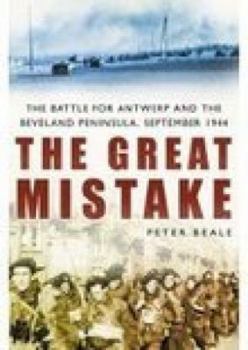The Great Mistake: The Battle for Antwerp and the Beveland Peninsula, September 1944
On 4 September 1944, the British 11th Armoured Division entered Antwerp, capturing the docks intact. Basing his account on official war diaries, unit histories and personal recollections, Peter Beale... This description may be from another edition of this product.
Format:Hardcover
Language:English
ISBN:0750932864
ISBN13:9780750932868
Release Date:January 2004
Publisher:History Press (SC)
Length:227 Pages
Weight:2.45 lbs.
Dimensions:1.0" x 6.4" x 9.4"
Related Subjects
HistoryCustomer Reviews
1 rating
Atypical in approach, but highly readable, with a significant payoff to the reader
Published by Thriftbooks.com User , 18 years ago
Atypical, but highly readable, with a significant payoff to the reader on an important but generally underappreciated portion of ETO action Peter Beale has crafted a must read for the serious student of World War II history. Upon reading "The Great Mistake" one is immediately struck by the marked difference in the approach Beale has taken to address this topic from that of most historical authors. As a scientist by training this reviewer greatly appreciated the quite analytical way Beale tackled is topic. Right out of the gate (p. 1 in fact) Beale establishes that The Great Mistake in its simplest form refers to the "failure of the Allies to cross the Albert Canal immediately upon capture of Antwerp" in early September 1944 (as first coined by Cornelius Ryan in "A Bridge Too Far"). Beale shortly thereafter (p. 7) gives the reader his expanded thesis: "...failure by the Allies to send whatever force could be mustered to seize a crossing over the Albert Canal at Merxem (as the Belgian White Brigade encouraged and implored them to do), and send an armoured column with all possible speed to the isthmus 2 miles west of Woensdrecht. This column would have had to be reinforced promptly to put in place a block to prevent the escape of the 15th Army. But had this been done, and then followed up once again very promptly with more troops, there could have been an opportunity to sweep up the Beveland peninsula during the very short period that existed until the resilient Germans reorganized themselves. The Great Mistake was to lose this fleeting opportunity." From this point in the book onward Beale crafts a readable and engaging story that weaves together a variety of pieces of information from combat prose to explanations of logistical concerns and command personalities in an attempt to rigorously assess his thesis. Very few historical works are this well and thoroughly structured. Beale is able to step away from the issues at hand and present an even and seemingly unbiased assessment of the issues leading up to and following the capture of Antwerp on 4 Sept 44, and how these events influenced the progression of the war in NW Europe. This is a topic of considerable interest that remains debated to present day some 60 odd year after the facts. Beale seems to have put most of the necessary pieces of the picture together to generate a narrative that is both enlightening and engaging. For the most part Beale avoids finger pointing and generally provides critical assessment of all commanders and decisions being made, although in the end he is most critical of Montgomery since he as ground commander in the northern sector of the ETO (21 Army Group sector) "could make decisions to meet the changing circumstances. After the capture of Antwerp he could have ordered the exploitation north, the crossing of the Albert Canal and the advance to Woensdrecht. Only he can be blamed for the failure to act, and he had complete authority to do so...It was Mon





